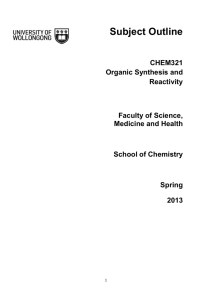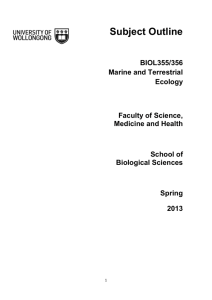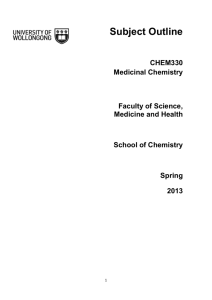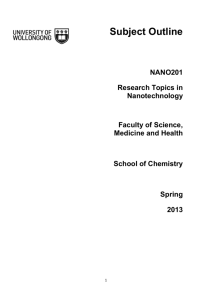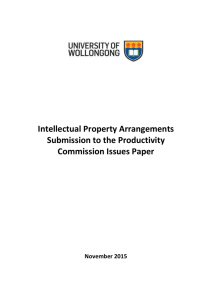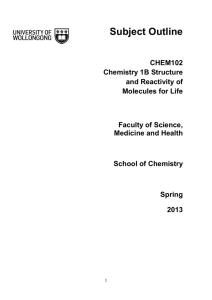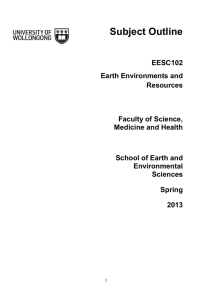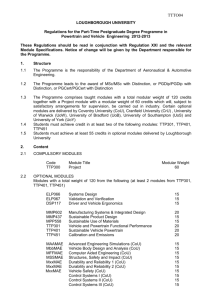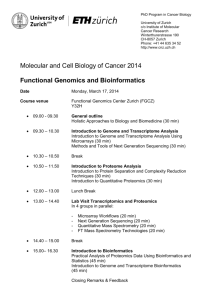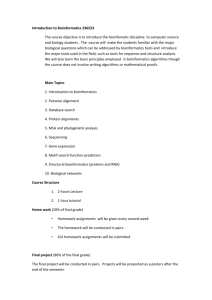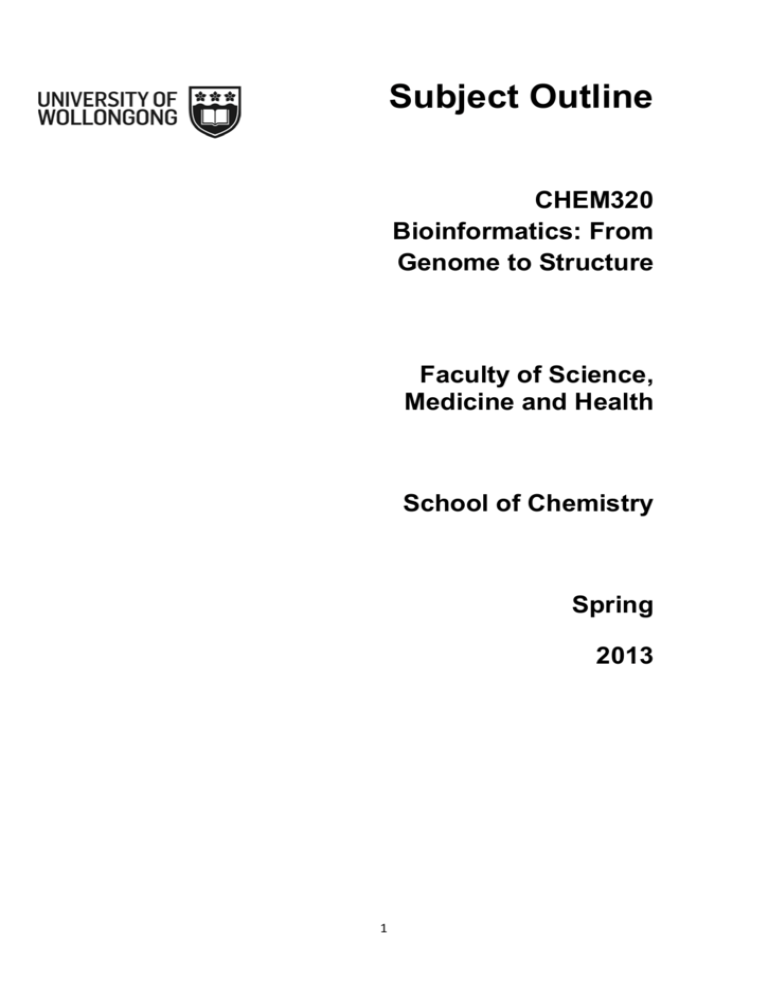
Subject Outline
CHEM320
Bioinformatics: From
Genome to Structure
Faculty of Science,
Medicine and Health
School of Chemistry
Spring
2013
1
Subject Outline
Subject code:
CHEM320
Subject name:
Bioinformatics From Genome to Structure
Credit points:
8
Pre/co-requisites:
BIOL213
Mode of delivery:
On Campus
Delivery location:
Wollongong
Version history
2nd edition
Jennifer Beck , Faculty of Science Medicine and Health , UOW
1st edition
Jennifer Beck , Faculty of Science , UOW
© University of Wollongong 2013. All rights reserved.
2013
2003
Copyright and Disclaimer
No part of this work may be reproduced without the prior written consent of the University of Wollongong. All requests and enquiries
should be directed to the Vice-Principal (Administration), University of Wollongong, Northfields Avenue, Wollongong NSW 2522
Australia. Within Australia telephone (02) 4221 3920; international +61 2 4221 3920.
http://www.uow.edu.au/about/disclaimer/index.html
The University of Wollongong attempts to ensure that the information contained here is correct at the time of production, however,
sections may be amended without notice by the University in response to changing circumstances or for any other reason.
2
Contacts
Subject Co-ordinator
Name:
Prof. Jennifer Beck
Faculty of Science, Medicine and Health
Location
41.152
Telephone
Email
61 2 4221 3492
smah_student_enquiries@uow.edu.au
Consultation mode and times:
_________________________________________________________________________
Prof Jennifer Beck (coordinator)
Room 18.132
ph. 4221 4177
E-mail: jbeck@uow.edu.au
Consultation time: Friday 8.30 – 10.30 am
Prof Mark Dowton
Room 35.G19c
ph. 4221 3013
E-mail: mdowton@uow.edu.au
Consultation time: Friday 12.30 – 2.30 pm
Dr Haibo Yu
Room 18.G26
ph. 4221 4235
E-mail: hyu@uow.edu.au
Consultation time: Tuesday 3.30 pm-5.30 pm
Dr Carolyn Dillon
Room 18.129
ph. 4221 4930
E-mail: carolynd@uow.edu.au
Consultation time: Tuesday 2.30-4.30 pm
Assoc Prof Aaron Oakley
Room 18.G25
ph. 4221 4347
E-mail: aarono@uow.edu.au
Consultation time: Tuesday 2.30-4.30 pm
Prof Nick Dixon
Room 18.G10
ph. 4221 4346
E-mail: nickd@uow.edu.au
Consultation time: Tuesday 2.30-4.30 pm
Ms Karin Maxwell (technical officer)
Room 18.G02
ph. 4221 5357
E-mail: kmaxwell@uow.edu.au
3
Subject Information
Outline
CHEM320 builds upon material covered in BIOL213 Principles of Biochemistry, BIOL214
Biochemistry of Energy and Metabolism, BIOL215 Genetics, BIOL320 Molecular Cell Biology,
BIOL303 Biotechnology and CHEM212 Organic Chemistry.
The course will be divided into three strands of approximately equal length:
1. Bioinformatics
2. Biological macromolecules – structure and function
3. Proteomics
In the practical course, bioinformatics will be explored in computer-based tutorials and
practicals. Databases for nucleic acid and protein sequences, structures and other parameters
of biological molecules, plus linkages to the scientific literature, will be used to extract
information and to compare and analyse these data. Proteomics and protein and nucleic acid
structure will also be investigated via computer-based practicals.
In the laboratory,
structure/function aspects of the protein, lysozyme, will be analysed via chemical and
spectroscopic methods.
Learning Outcomes
Through successful completion of this subject students will be able to:
• appreciate the significance and scope of bioinformatics in biology and biotechnology;
• access and utilise a range of databases with computer-based applications to discover
information about genes, their products and biological effects;
• contrast how biological macromolecules interact and regulate chemical reactions in biology;
• understand the significance and scope of bioinformatics in biotechnology, pharmaceuticals
and medicine;
• be competent in accessing and utilising biological databases with a range of computerbased applications;
• understand the methods used to isolate and identify proteins (proteomics).
4
Faculty Graduate Qualities
Valuable qualities gained by UOW graduates are essential for gaining employment and making
an important contribution to society and their chosen field – further information is available
at http://www.uow.edu.au/about/teaching/qualities/
Engagement in this subject will contribute to each student’s development of the following UOW
Graduate Qualities:
Informed
• Comprehensive knowledge of an area of Science and well-developed skills in using
relevant technologies
•
Awareness of the international context in which advances in Science are made and
applied
Independent learners
• Critical thinking skills
•
Scientific approach to the acquisition, analysis, and interpretation of data
•
Independence in seeking to extend knowledge through ongoing research, enquiry and
reflection
•
Problem solvers
•
Application of creative, logical and critical thinking to scientific problems
Effective communicators
• Well-developed written, oral & aural communication
•
Effective collaboration and teamwork across a range of settings and cultures
Responsible
• Ethical decision making
•
Respect for diverse opinions, professions, and cultures
5
Lecture/ Laboratory Times
Refer to http://www.uow.edu.au/student/timetables/index.html for an up-to-date timetable.
Week
Lectures
1-3 (inclusive)
Monday
Practical
10.30
am-1.30
pm
in Tuesday 1.30-4.30 pm in 17.110B
38.G01
(Each student to attend no more than
1.5 hours each week in weeks 1-3)
4-7 (inclusive)
Monday 10.30-12.30 pm in 38.G01
Tuesday 1.30-5.30 pm in 17.110B
(Each student to attend no more than 2
hours each week in weeks 4-7)
8-13
Monday
(inclusive)
38.G01
10.30
am-1.30
pm
in Either Tuesday 9.30-12.30 in 41.343
OR Thursday 1.30-4.30 pm in 41.343
(Note you will also be able to choose to
do these practicals in either weeks 8
and 9 or 10 and 11; remaining two
weeks for any students who need extra
time)
This is a computer practical. Students with surnames A-L should attend from 1.30-3.00 pm;
students with surnames M-Z should attend from 3.00-4.30 pm. Please see note on next page
about timetable clashes. Students with surnames A-L should attend from 1.30-3.30 pm;
students with surnames M-Z should attend from 3.30-5.30 pm. Please see note below about
timetable clashes.
During your practical in weeks 1-3 we will assign you to Tuesday or Thursday (either weeks
8 and 9 OR 10 and 11) for the wet practical (Protein Chemistry of Lysozyme) in the remaining
weeks.
ABOUT TIMETABLE CLASHES with computer practical in weeks 1--7:
Some students will have a timetable clash with the computer practicals and will need to diverge
from what is outlined in the footnote to the Table. To manage this, note that since it is a
computer prac, that the timeslot that you attend during the four hours (weeks 4-7) or three
hours (weeks 1-3) can be flexible. For example, in weeks 1-3, those students who have a
lecture in another subject from 2.30-3.30 pm can attend the CHEM320 computer prac in
17.110B from 1.30-2.30 pm and return to carry out more computer work from 3.30-4.30 pm.
For students with other clashes who are not sure about when they should attend, contact Mark
Dowton for advice on weeks 4-7.
Weeks 1-7 inclusive will involve computer-based practicals (bioinformatics, protein and nucleic
acid structure). In weeks 8-12, there will be a laboratory-based practical investigating
structure/function aspects of the protein, lysozyme. In addition, there is a “take-home”
proteomics assignment in which students will identify a protein using experimental data
(provided) and bioinformatics databases available through the internet.
6
Study Time
Students should note that UOW policy equates 1 credit point with 2 hours of study per week
that includes lectures and tutorials. For example, in a 6 credit point subject, a total of 12 hours
of study per week is expected.
Recommended Study
Access the library for books and journal articles as required.
Materials
Safety glasses and lab coat fro weeks 8-11.
e-Learning
This subject has materials and activities available via eLearning. To access eLearning you
must have a UOW user account name and password, and be enrolled in the subject. eLearning
is accessed via SOLS (student online services). Log on to SOLS and then click on the
eLearning link in the menu column.
For information regarding the eLearning spaces please use the following links:
Blackboard Vista - http://www.uow.edu.au/student/elearning/vista/index.html.
Moodle - http://uowblogs.com/moodlelab/files/2013/05/Moodle_StudentGuide-1petpo7.pdf
7
Lecture Schedule
Date Week
Lecture Topics
29/7
1
[HY(3L)]
Hierarchy and classification of protein structure
5/8
2
[HY(2L),CD]
Protein structure and function
12/8
3
[CD(3L)]
Post-translational modifications; methods
19/8
4
[MD(2L)]
Central concepts in bioinformatics; bioinformatics
databases
26/8
5
[MD(2L)]
Gene evolution and sequence alignment
Phylogenetic analysis
2/9
6
[MD(2L)]
Sequencing of entire genomes
9/9
7
[MD(2L)]
Genome annotation and transcriptomics
16/9
8
[JB(3L)]
Protein purification and protein chemistry
23/9
9
[JB (2L)]
MID-SESSION TEST (10.30-11.30 am) Two lectures to be
given after the test. Protein chemistry/proteomics
Mid-session recess (Sept. 30 –Monday Oct. 4)
14/10
11
[JB(3L)]
Protein-protein interactions; Structure of DNA, RNA
21/10
12
[JB(2L),AO]
Nucleic acids as drug targest; protein crystallography
28/10
13
[AO,ND(2L)]
Protein structure determination; case study of proteinnucleic acid interactions
****
Key: MD, Mark Dowton; HY, Haibo Yu; CD, Carolyn Dillon; AO, Aaron Oakley; JB, Jenny
Beck; ND, Nick Dixon
8
PRACTICAL COURSE
Date Week
*
Practical Topic
July 30
1
[HY,AO]
Molecular modelling of biological macromolecules
Aug. 6
2
[HY,AO]
Molecular modelling of biological macromolecules
Aug. 13
3
[HY,AO]
Molecular modelling of biological macromolecules
Aug. 20
4
[MD]
Sequence similarity searching
Aug. 27
5
[MD]
Molecular evolution analyses, small genome
construction.
Sept. 3
6
[MD]
Phylogenetic analysis of sequences
Sept. 10
7
[MD]
Phylogenetic analysis of sequences
Sept. 17,19
8
[CD]
Protein chemistry of lysozyme
Sept. 24,26
9
[CD]
Protein chemistry of lysozyme
Mid-session recess (Sept. 30 – Oct. 4)
Oct. 8,10
10
[CD]
Protein chemistry of lysozyme
Oct. 15,17
11
[CD]
Protein chemistry of lysozyme
Oct. 22,24
12
[CD]
This timeslot will be used for students to complete
****
Key: MD, Mark Dowton; HY, Haibo Yu; CD, Carolyn Dillon; JB, Jenny Beck; AO, Aaron Oakley
*
There is also a “take-home” Proteomics practical to be accessed from the subject
Moodle site.
9
Assessment Tasks
_________________________________________________________________________
Minimum attendance requirements
All practicals must be attended unless academic consideration is sought and confirmed. It is
advised that students attend each lecture.
Minimum performance requirements
Students need to complete each component at the level specified.
Final exam
55%
Quiz (week 9)
10% (multiple choice)
Practical work
35%
The theory and practical components of Chemistry and Biological Sciences subjects are both
important. To obtain a Pass grade, you must reach an acceptable standard in both components
and you must obtain a final examination mark of 45% or greater. To obtain a pass grade, you
must therefore achieve at least 45% for this component, whatever overall mark you might
achieve for the subject. To summarise:
To obtain a pass or higher grade in this subject, a student must:
(i)
obtain an exam mark of ≥ 45% and a total mark of ≥ 50%
(ii)
obtain a mark of ≥ 50% in the practical component
Performance grades
HD
High Distinction
85–100%
D
Distinction
75–84%
C
Credit
65–74%
P
Pass
50–64%
PS
Pass Supplementary
50%
F
Fail (unsatisfactory completion)
0–49%
TF
Technical Fail
No mark recorded
If a student fails this subject, but obtains 65% or greater in the practical, the practicals
do not have to be repeated when the subject is repeated.
Students who do not meet the minimum performance requirements as set out in the Subject
Outline may be given a Fail grade or TF (Technical Fail) grade on their Academic Transcript.
See
the
General
Course
Rules
at http://www.uow.edu.au/handbook/generalcourserules/index.html
10
Medical certificates
If medical issues impede your progress it is in your interest to submit a medical certificate.
These must be submitted to student administration, not the course coordinator or demonstrator.
If you are going to be absent for a period longer than a week, or if you miss a practical, discuss
this with the course coordinator as soon as possible.
Scaling
Marks awarded for any assessment task (including examinations) may be subject to scaling at
the end of the session by the Unit Assessment Committee and/or the Faculty Assessment
Committee (FAC). Marks will only be scaled to ensure fairness/parity of marking across groups
of students. Scaling will not affect any individual student’s rank order within their cohort. For
more
information
refer
to
Assessment
Guidelines
–
Scaling http://www.uow.edu.au/about/policy/UOW058609.html
Submission and Return of Assessment Items
The practical component of this subject consists of three assignment reports (one in
bioinformatics and one each in molecular modelling and proteomics) and two practical reports
to be handed in on templates contained within this manual. All reports are to be handed in to
Science, Medicine and Health (SMAH) Central by 2.30 pm on the due date. Failure to meet
these deadlines will result in a 10% penalty for each day that the report is late.
The process for submission is as follows:
• Download an assignment cover sheet from the link on the SMAH Central website. Sign
and date the assignment cover sheet and attach it to your assignment. Use staples or
bind your assignment.
• Submit your assignment to SMAH Central (Building 41, Level 1, Room 152 (B41.152))
before 2.30 pm of the due date. Note that the SMAH Central opening hours are
currently 9.00 am – 5.00 pm
• After SMAH Central logs your assignment you will receive a confirmation email.
• When the assignment has been marked, students will receive an email stating that the
marked assignment is available for collection from SMAH Central.
Uncollected assessment tasks will be destroyed 21 days after the release of
marks for that session procedures for the retention of written work.
Due dates for the THREE (3) Assignment Reports:
1) Tuesday 27th August by 2.30 PM (week 5; Molecular Modelling of Biological
Macromolecules). For advice contact Prof Jenny Beck.
2) Wednesday 11th September by 2.30 PM (week 7). For advice contact Prof Mark
Dowton.
3) Wednesday 23th October by 2.30 PM (week 12; “take-home” Proteomics assignment).
For advice contact Prof Jenny Beck.
Guidelines on the format of the reports is given in the practicals and the criteria for
assessing these reports will be discussed with you.
11
Due dates for the TWO (2) Practical Reports (on templates from this subject manual):
1) Wednesday 11th September by 2.30 PM (week 7). For advice contact Prof Mark
Dowton.
2) Wednesday 30th October by 2.30 PM (week 13; Protein Chemistry of Lysozyme). For
advice contact Dr Carolyn Dillon.
The practical reports are to be written up on the templates provided at the end of each
practical.
Note that the Molecular Modelling practical is worth 11.7% and the other pracs/
assignments are worth 5.8% of the total mark each.
MOLECULAR MODELLING OF BIOLOGICAL MACROMOLECULES
This is a computer based tutorial commenced in the Computer Lab 17.110B on Tuesday
afternoons and completed in the student’s own time. The requirements for the write-up for this
assignment are contained within the practical instructions in this manual.
BIOINFORMATICS Assignments: WEEKS 4-7
These are computer-based exercises, commenced in the Computer Lab 17.110B on
Tuesday afternoons and completed in the student's own time. Two reports will be submitted
for assessment. These will require each student to analyse unique sequences and the reports
must be completed individually. The guidelines and requirements will be distributed in class.
PROTEOMICS Assignment
You will be given a take-home exercise via Moodle to complete for this assignment.
PROTEIN CHEMISTRY OF LYSOZYME
The “wet” prac is to be carried out in 41.343 over weeks 8-12 (depending on the number of
students: resources). You will work on either Tuesdays or Thursdays of either weeks 8 and 9 or
10 and 11 (weeks 12 and 13 for catch up if necessary). We will sign you up for a particular
day/weeks in the computer practical in week 5 or 6. The practical report is to be handed in
on the templates provided in this manual.
Students are advised to keep an electronic or hard copy of all submitted assessment tasks
except in circumstances where this is not possible e.g. where the task is submitted at the end
of activity in which it was completed.
12
Late Submission
All assessment tasks are to be submitted on the due dates as specified in this Subject Manual.
Assessment tasks submitted late will be penalised by the deduction of 10% of the maximum
possible mark for the assessment task per calendar day or part thereof. Deduction of marks will
not result in a negative mark.
Note that assessment tasks submitted to SMAH Central must be submitted by 2:30 pm on the
due date to guarantee being recorded in SATS as being submitted on time.
Academic Consideration including Extensions of Time
Applications from students for academic consideration should be made only on the grounds of
serious or extenuating circumstances. Applications for academic consideration are governed by
the
University’s
Student
Academic
Consideration
Policy
at http://www.uow.edu.au/about/policy/UOW058721.html
Do not assume that an application for special consideration will be automatically granted.
Supplementary Assessments
Supplementary assessment may be offered to students who receive a mark of 48% or 49%,
and are otherwise identified as meriting an offer of a supplementary assessment. The form of
supplementary assessment will be determined at the time the offer of a supplementary
assessment is made. For more information refer to the Supplementary Assessment
Guidelines http://www.uow.edu.au/content/groups/public/@web/@gov/documents/doc/uow112
335.pdf.
Note that if you are offered a supplementary examination as the supplementary assessment
that you will need to sit the examination in the supplementary examination period.
Referencing
Choose a consistent referencing style (e.g. use a style from a journal in the research area of
the project) or ask the lecturer responsible for the subject.
Please
consult
the
UOW
library
website
for
further
information: http://public01.library.uow.edu.au/refcite/style-guides/html/
Plagiarism
Students are responsible for submitting original work for assessment, without plagiarising or
cheating, abiding by the University’s policy on plagiarism as set out in the University Handbook
under the University’s Policy Directory. Plagiarism has led to expulsion from the University.
The University’s Academic Integrity and Plagiarism Policy, Faculty Handbooks and subject
guides clearly set out the University’s expectation that students submit only their own original
work for assessment and avoid plagiarising the work of others or cheating. Re-using any of
your own work (either in part or in full) which you have submitted previously for assessment is
not permitted without appropriate acknowledgement. Plagiarism can be detected and has led to
students being expelled from the University.
13
The use by students of any website that provides access to essays or other assessment items
(sometimes promoted as ‘resources’) is extremely unwise. Students who provide an
assessment item (or provide access to an assessment item) to others, either directly or
indirectly (for example by uploading an assessment item to a website) are considered by the
university to be intentionally or recklessly helping other students to cheat. This is considered
academic misconduct and students place themselves at risk of being expelled from the
University. http://www.uow.edu.au/about/policy/UOW058648.html
General Advice
Students should refer to the Faculty of Science, Medicine and Health website for information on
policies, learning and support services and other general advice.
Use of Electronic Devices in Timetabled Activites
Ensure that mobile phones are turned off or turned to silent before timetabled activities.
Electronic devices including mobile phones and portable MP3 players should not be accessed
during timetabled activities unless otherwise advised.
14



